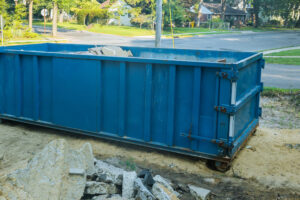Dumpster diving on building projects raises complex moral and legal questions that many people find challenging.
As cities grow and development projects flourish, salvaging waste items in a rented dumpster from these sites has become more of a trend.
While some see it as a sustainable approach to recycling important materials, others are concerned about potential legal ramifications and safety risks. Anyone thinking about trash diving in construction zones should first understand the legal framework around the practice.
This article looks into the legal concerns, potential hazards, and considerations that will assist you in navigating the complexity of trash diving on building sites.
What Does It Mean To Dumpster Dive?

Dumpster Diving Laws in NJ
This process entails searching through company or household waste containers, dumpsters, or trashcans for abandoned items that can be retrieved or reused. It is all about salvaging furniture, clothing, or other goods that are still functioning but are deemed trash by others. Dumpster diving is often associated with recycling and sustainable living, but it may also cause health and legal issues, depending on local regulations and the condition of the rescued things. Many people regard it as a way to reduce waste while also obtaining access to resources that might otherwise be lost.
Legal Considerations
Building sites are private property, and unlawful entrance may result in trespassing charges. Even if the goods in the trash appear to be dumped, they still belong to the property owner or contractor. Dumpster diving is considered theft in several jurisdictions, especially if the objects are not publicly abandoned for public recovery. In addition, approaching a building site without authority may pose safety risks and significant liability. Before attempting to recover goods from a construction site dumpster, ensure that you have specific authorization from the property owner or site manager.
Property Rights and Permissions
Understanding property rights and permits is critical when dumpster diving at a building site to prevent legal ramifications. Construction sites are private property, and unlawful intrusion can result in trespass penalties. Property rights extend to restricting access and use of things discovered on-site, which implies that everything thrown in a dumpster is still the property of the construction business or site owner. To lawfully trash dive, you must first get specific authorization from the property owner or management.
Furthermore, construction sites frequently have increased security measures and safety concerns, making it critical to follow site rules and prioritize personal safety. Obtaining written consent can shield persons from potential legal concerns and guarantee that they do not unwittingly violate the rights of others. Always approach such actions with prudence and an understanding of the legal limitations involved.
Safety Concerns
For starters, construction sites are frequently cluttered with sharp, dangerous items like shattered glass, nails, and metal shards, all of which can cause serious injuries. Furthermore, the possibility of exposure to harmful substances such as asbestos or chemicals found in waste items is substantial and presents health risks. Construction waste’s unstable nature can cause accidents, such as collapses and falls. Furthermore, unlawful entry to building sites may result in legal ramifications or contacts with site security. To reduce these hazards, individuals should wear suitable protective gear, such as gloves and sturdy boots, and work with a qualified partner or expert. Awareness of the site’s risks and adherence to safety standards are critical for avoiding harm and having a safer dumpster diving experience.
Environmental Considerations
While recovering items from construction debris can minimize landfill contributions and increase recycling, incorrect treatment can result in hazardous chemicals being mismanaged, endangering both health and the environment. Ethically, the technique raises concerns regarding legality and property rights. Accessing construction site dumpsters without authorization is generally prohibited and considered a violation of property rights. There is also worry about safety, both for the dumpster diver and for the staff on-site. Those considering dumpster diving must carefully evaluate these aspects to ensure that their acts are lawful and ethical while also supporting environmental stewardship.
Although individuals can be tempted to dumpster dive at construction sites, it is important to do so cautiously and be aware of the potential legal repercussions. Since regulations might vary significantly, always check local laws and obtain the required permits. It is also important to think about the safety concerns and possible risks that may occur. It could be safer and less stressful if individuals are knowledgeable and respectful of property rights. In the end, careful consideration of these prospects necessitates abiding by the law and exercising caution.




